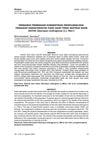 September 2023 in “Journal of The American Academy of Dermatology”
September 2023 in “Journal of The American Academy of Dermatology” Caffeine may help hair grow better.
66 citations,
February 2007 in “The journal of investigative dermatology/Journal of investigative dermatology” Adenosine may promote hair growth by increasing FGF-7 levels in dermal papilla cells.
 61 citations,
May 2014 in “International journal of pharmaceutics”
61 citations,
May 2014 in “International journal of pharmaceutics” Nanocrystals improve skin penetration and stability of caffeine, suggesting a new method for delivering similar substances through the skin.
 3 citations,
April 2019 in “Journal of Dermatological Treatment”
3 citations,
April 2019 in “Journal of Dermatological Treatment” Caffeine shows promise for treating some types of hair loss, but more research is needed.
 1 citations,
July 2023 in “Cosmetics”
1 citations,
July 2023 in “Cosmetics” The new shampoo effectively delivers caffeine to hair follicles to help keep hair, especially as people age.
 1 citations,
January 2019 in “Advances in Medical Sciences”
1 citations,
January 2019 in “Advances in Medical Sciences” The combination of azelaic acid, minoxidil, and caffeine significantly increased the survival of skin flaps by affecting certain body channels and nitric oxide levels.
 November 2024 in “International Journal of Molecular Sciences”
November 2024 in “International Journal of Molecular Sciences” Nanoparticles may improve caffeine delivery for hair growth, offering a potential alternative to minoxidil for hair loss treatment.
 November 2023 in “Journal of Cosmetic Dermatology”
November 2023 in “Journal of Cosmetic Dermatology” The topical treatment with caffeine and Procapil 3% improved male pattern hair loss and was well tolerated after 12 weeks.
December 2022 in “Clinical and experimental dermatology and therapies” Adding the topical gel improved hair growth more than using minoxidil or finasteride alone.
2 citations,
December 2021 in “Pharmaceutics” Finasteride-loaded proniosomes effectively promote hair growth in mice.
 25 citations,
June 2011 in “International journal of pharmaceutics”
25 citations,
June 2011 in “International journal of pharmaceutics” Nanoparticles effectively deliver water-insoluble drugs to hair follicles, stimulating hair growth without irritating the skin.
 2 citations,
July 2018 in “Elsevier eBooks”
2 citations,
July 2018 in “Elsevier eBooks” Some supplements may help with hair loss, but there's not enough strong evidence to recommend them without doctor advice.
 61 citations,
January 2018 in “Cosmetics”
61 citations,
January 2018 in “Cosmetics” Coffee silverskin may be a beneficial and safe ingredient for cosmetics, offering hydration, firmness, and potential hair growth benefits.
 46 citations,
October 2012 in “Dermatologic Clinics”
46 citations,
October 2012 in “Dermatologic Clinics” Female pattern hair loss diagnosed by scalp appearance, treated with combined therapies and targeted approaches.
 14 citations,
October 2020 in “Natural Products and Bioprospecting”
14 citations,
October 2020 in “Natural Products and Bioprospecting” Various treatments, including FDA-approved drugs, natural products, and oral supplements, can help with hair loss, but a patient's medical history and potential allergies should be considered when choosing a treatment.
 11 citations,
January 2013 in “Postępy Dermatologii i Alergologii”
11 citations,
January 2013 in “Postępy Dermatologii i Alergologii” The conclusion is that a combination of noninvasive treatments and lifestyle changes can improve skin health during menopause.
 7 citations,
February 2018 in “International Journal of Pharmaceutics”
7 citations,
February 2018 in “International Journal of Pharmaceutics” Researchers developed a method to measure drugs in hair follicles and found that both water-loving and fat-loving drugs can be detected after being applied to the skin.
 1 citations,
May 2021 in “Journal of Cosmetic Dermatology”
1 citations,
May 2021 in “Journal of Cosmetic Dermatology” Cosmetic foam product reduces hair loss and increases hair density in men.
 1 citations,
March 2018 in “Dermatologie pro praxi”
1 citations,
March 2018 in “Dermatologie pro praxi” Most over-the-counter hair loss treatments lack strong evidence of effectiveness, except for minoxidil, which works but stops working if you stop using it.
 September 2014 in “Springer eBooks”
September 2014 in “Springer eBooks” Aging causes hair to gray and thin, with the timing of graying varying by race, and factors like oxidative stress and genetics can lead to hair loss.
 100 citations,
June 2011 in “Journal of The American Academy of Dermatology”
100 citations,
June 2011 in “Journal of The American Academy of Dermatology” 5% minoxidil foam once daily works as well as 2% minoxidil solution twice daily for female hair growth and is more convenient.
 25 citations,
June 2013 in “Obesity Reviews”
25 citations,
June 2013 in “Obesity Reviews” Mesotherapy might help reduce fat in specific areas for those close to their ideal weight, but more research and care are needed to ensure safety.

Different amounts of propylene glycol change the thickness of katuk leaf hair tonic.
 295 citations,
September 2006 in “Cell Cycle”
295 citations,
September 2006 in “Cell Cycle” The conclusion is that using drugs to block the TOR pathway might slow aging and prevent age-related diseases.
 76 citations,
February 2021 in “International Journal of Molecular Sciences”
76 citations,
February 2021 in “International Journal of Molecular Sciences” Mesenchymal stem cells show potential for skin healing and anti-aging, but more research is needed for safe use, especially regarding stem cells from induced pluripotent sources.
 17 citations,
May 2015 in “Nanomedicine: Nanotechnology, Biology and Medicine”
17 citations,
May 2015 in “Nanomedicine: Nanotechnology, Biology and Medicine” Scientists created tiny particles loaded with a hair growth drug, minoxidil, that specifically target hair follicles and skin cells to potentially improve hair growth.

Arabica coffee pulp extract may help prevent hair loss and promote hair growth.
 29 citations,
May 1998 in “Bulletin of the American College of Nurse-Midwifery”
29 citations,
May 1998 in “Bulletin of the American College of Nurse-Midwifery” The document concludes that menopause should be seen as a natural part of aging and managed with personalized care and informed choices.
 4 citations,
July 2023 in “Pharmaceutics (Basel)”
4 citations,
July 2023 in “Pharmaceutics (Basel)” Nanoparticle-based drug delivery to hair follicles is more effective when tested under conditions that match skin behavior.
 3 citations,
January 2019 in “Elsevier eBooks”
3 citations,
January 2019 in “Elsevier eBooks” Pharmacists should interpret lab data and perform physical exams to improve patient care.



























